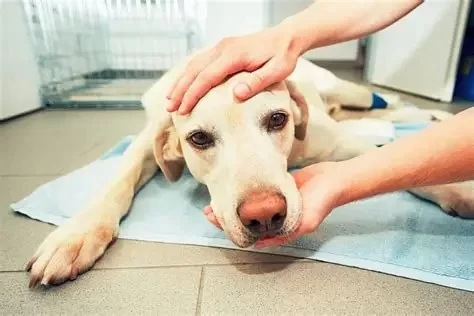10 Common Causes of Dog Diarrhea and When to See a Vet
- 1‑dietary‑indiscretion‑the‑most‑common‑trigger
- 2‑sudden‑diet‑changes‑can‑upset‑digestion
- 3‑parasitic‑infections‑often‑overlooked
- 4‑bacterial‑and‑viral‑infections‑dangerous‑signs
- 5‑stress‑and‑anxiety‑a‑surprising‑cause
- 6‑toxins‑or‑poisoning‑symptoms‑to‑watch
- 7‑underlying‑diseases‑linked‑to‑diarrhea
- 8‑food‑intolerances‑and‑allergies‑in‑dogs
- 9‑antibiotic‑or‑medication‑side‑effects
- 10‑when‑to‑see‑a‑vet‑dont‑wait‑too‑long
1. Dietary Indiscretion: The Most Common Trigger
The number one cause of dog diarrhea is what veterinarians call “dietary indiscretion”—or simply, your dog ate something it shouldn’t have. From garbage scraps to leftover pizza crusts or spoiled meat, many dogs will gobble up food off the ground with no hesitation. While some get away with it, others suffer the consequences within hours: loose stool, vomiting, or worse. In severe cases, that street-side snack could lead to gastrointestinal inflammation or pancreatitis, which requires immediate veterinary attention.
2. Sudden Diet Changes Can Upset Digestion
Switching your dog’s food too quickly is a recipe for digestive chaos. Whether you're changing brands or transitioning to raw, the gut microbiome needs time to adjust. Gradually mixing the new food over 7–10 days helps prevent gastrointestinal issues like diarrhea. One user shared how switching their Golden Retriever from kibble to freeze-dried raw overnight resulted in three days of loose, runny stools. That mistake cost them an unexpected vet bill and a valuable lesson.
3. Parasitic Infections: Often Overlooked
Worms and parasites such as Giardia, roundworms, or hookworms are a silent but serious cause of dog diarrhea, especially in puppies or dogs in group settings like shelters or parks. These infections can be picked up from contaminated water, feces, or soil. A fecal test is the best way to rule out parasites. If your dog has recurring diarrhea or sudden weight loss, it’s time to visit professionals like Hidden Brook Veterinary for a proper diagnosis.
4. Bacterial and Viral Infections: Dangerous Signs
Dogs can catch bacterial infections like Salmonella or viral illnesses such as parvovirus or coronavirus that lead to severe diarrhea. Puppies, seniors, and immunocompromised dogs are most at risk. Infected dogs may also show signs of lethargy, bloody stool, or fever. These are medical emergencies. Early detection and professional treatment are crucial for recovery and to prevent spreading the illness to other dogs.
5. Stress and Anxiety: A Surprising Cause
Believe it or not, emotional triggers like moving to a new home, boarding, or loud noises (fireworks, thunder) can trigger diarrhea. Dogs, especially sensitive breeds like Border Collies or Vizslas, can have stress-induced digestive issues. The gut-brain axis is real, and when a dog feels emotionally overwhelmed, it can affect their bowels. Helping your dog feel secure and maintaining routine can make a significant difference.
6. Toxins or Poisoning: Symptoms to Watch
Ingesting toxic substances such as chocolate, grapes, xylitol (found in gum), or household cleaners can lead to sudden, explosive diarrhea along with vomiting, drooling, or seizures. These situations are urgent. One pet owner shared how their Labrador consumed an entire box of raisins and developed bloody diarrhea within hours. Quick action from their local clinic likely saved the dog’s life. If poisoning is suspected, don’t wait—call or visit Hidden Brook Veterinary immediately.
7. Underlying Diseases Linked to Diarrhea
Sometimes, dog diarrhea is not caused by what’s in the stomach, but what’s happening deeper in the body. Conditions like inflammatory bowel disease (IBD), pancreatitis, liver dysfunction, or even cancer can all cause chronic diarrhea. These are typically accompanied by other signs such as weight loss, poor appetite, or fatigue. If diarrhea lasts more than a few days or becomes recurring, deeper diagnostics like blood work or ultrasounds may be needed.
8. Food Intolerances and Allergies in Dogs
Just like humans, dogs can have food sensitivities. Common culprits include dairy, grains, chicken, or beef. Chronic soft stool, itchy skin, or ear infections may indicate a food allergy. An elimination diet can help pinpoint the ingredient causing the issue. Hidden proteins in commercial treats can trigger flare-ups, so it’s critical to read labels and seek advice from veterinary nutritionists or trusted clinics like Hidden Brook Veterinary.
9. Antibiotic or Medication Side Effects
Many medications, especially antibiotics, can disrupt the natural flora in your dog’s gut, leading to temporary diarrhea. While this is often mild and self-limiting, in some dogs it becomes severe. Probiotics can help restore balance, but always consult with a vet before starting any supplement. If diarrhea persists after starting new meds, don't assume it's “normal”—your dog’s body could be reacting badly to the treatment.
10. When to See a Vet: Don’t Wait Too Long
So, when should you seek veterinary care for dog diarrhea? Here are clear red flags:
- Diarrhea lasts more than 2 days
- Presence of blood or mucus in stool
- Vomiting alongside diarrhea
- Lethargy, fever, or refusal to eat
- Sudden weight loss or dehydration
Waiting too long can turn a manageable problem into a crisis. Professional clinics like Hidden Brook Veterinary are equipped with tools for rapid testing, IV fluids, and diagnostics to get to the root of the problem quickly.
Understanding the causes of dog diarrhea can ease a lot of stress and confusion. From dietary mistakes to deeper health issues, knowing what to look for and when to act can make all the difference. If in doubt, always consult a trusted vet to keep your dog safe, comfortable, and thriving.











